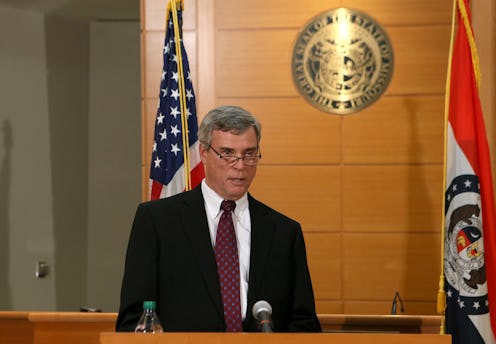News
One Ferguson Juror Is Suing To Talk About The Case
A member of the Darren Wilson grand jury is suing prosecutor Bob McCulloch to speak publicly about the case more than a month after the police officer was cleared of charges in the shooting death of Michael Brown. Criminal proceedings seen by a grand jury are, by law, kept secret. But considering that McCulloch released evidence in the case and, in New York, a judge is weighing whether to make information from the Eric Garner case public, this lawsuit could be one more step toward finding out exactly what's happening in the courtrooms.
The juror, known only as "Grand Juror Doe," names McCulloch, the St. Louis County prosecutor, in the federal lawsuit. The American Civil Liberties Union (ACLU) of Missouri, which is representing the grand juror, said on its website:
Doe would like to talk about the experience of serving on a grand jury, the evidence presented and the investigation in a way that could contribute to the public dialogue concerning race relations.
In the lawsuit, the plaintiff alleges that the way the evidence was presented to the grand jury was significantly different than previous cases and skewed toward focusing more on the victim. Grand Juror Doe alleges that "the presentation of the law to which the grand jurors were to apply the facts was made in a muddled and untimely manner." The lawsuit also states that McCulloch's statement about the non-indictment seemed to characterize the jury as having one collective opinion that there was no support for the charges, an opinion with which the plaintiff does not seem to agree.
Grand jury deliberations are meant to be kept secret mainly to protect the privacy of the defendant, but in the statement, Tony Rothert, legal director of the ACLU of Missouri, says, "The First Amendment prevents the state from imposing a life-time gag order in cases where the prosecuting attorney has purported to be transparent."
The plaintiff argues that McCulloch promised transparency, both to the grand jury and to the public. And though that kind of happened — after three rounds of releasing evidence — hearing the grand juror talk about this heavily publicized case might just be what's needed for a fuller picture of what happened not only in the Brown case, but also what might have happened with the grand jury in the similar case of Garner.
The lawsuit states:
From Plaintiff's perspective, although the release of a large number of records provides an appearance of transparency, with heavy redactions and the absence of context, those records do not fully portray the proceedings before the grand jury.
If Grand Juror Doe is successful and is allowed to talk publicly about the proceedings in the Darren Wilson grand jury, the transparency that McCulloch promised would be achieved. With a desire to share insight into his or her experience as a grand juror, add to the public dialogue on race relations, opine on whether transparency was truly provided, and advocate for changes in the way Missouri grand juries are conducted, the plaintiff could greatly contribute to the public's understanding of grand juries and this case.
Image: Getty Images (1)
